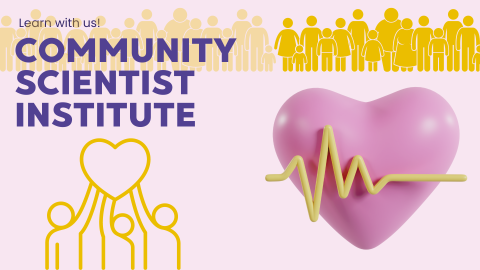Community Scientist Institute
Cancer is the leading cause of premature death before the age of 65. As the early onset and diagnosis of cancer continues to increase, we need more community voices involved to develop new ways to reduce the cancer burden.
This eight-week course delivered through the Continuing Education Program at The City College of New York is designed to introduce the concepts and skills to individuals who are interested in developing community-relevant research. The course is specifically designed to engage community members in addressing the cancer burden in New York City. Cancer is the leading cause of premature death before the age of 65.
As the onset and diagnosis of cancer continues to increase, we need more community voices involved to develop new ways to reduce the cancer burden. Individuals are expected to attend in-person sessions on Saturdays and review the course material online for each module prior to the next class.
Course Outline
*Subject to change.
- Module 1: Introduction to Cancer and Why Community Scientists are Essential (Week 1)
- The Cancer Burden: What We Know, What We Don’t Know, and What It Means for Overall Health Equity
- Community Science and the Importance of Advocacy
- What is Cancer: Basic Biology of Cancer
- Module 2: Cancer Research (Week 2)
- Understanding Cancer Research Study Designs
- Translational Science: From Bench to Bedside
- Research Advocacy in Translational Science
- Module 3: Clinical Trials (Week 3)
- Clinical Trials: What and Why?
- Barriers to Enrollment in Clinical Trials and Health Empowerment
- Human Subjects and Ethics
- Module 4: Clinical Research Training- Part I (Week 4)
- Community Translational Research
- Experimental Design
- Why Statistics Matter
- Module 5: Clinical Research Training- Part II (Week 5)
- Recruitment, Retention, and Engagement
- Data Collection Tools and Quality Control
- Research Dissemination
- Module 6: Health Education and Community-Based Participatory Research (Week 6)
-
Understanding Evidence-Based Healthcare
-
Collaborating with Stakeholders
-
A Guide to Preparing Final Presentations
-
-
Module 7: Career Development Workshops (Week 7)
-
Designing a Resume
-
Interview Skills
-
Career Panel
-
-
Module 8: Final Presentations (Week 8)
-
Final Presentation
-
Course Objectives
- Present an overview on cancer and the cancer burden
- Introduce the principles of research, including study design and protocol development
- Provide essential training in the skills to become more involved in community-relevant research
- Increase diversity in workforce for clinical and public health research
After completion of these core modules, participants will be able to:
- Serve on IRBs and as community research advocates on grant applications
- Obtain clinical research skills to become community research advocates
Course Principles
- No prerequisites
- Hybrid program with recorded material and on-site Saturday workshops
- Networking and resources for graduates after training
Register Here:
Last Updated: 09/25/2024 10:15
